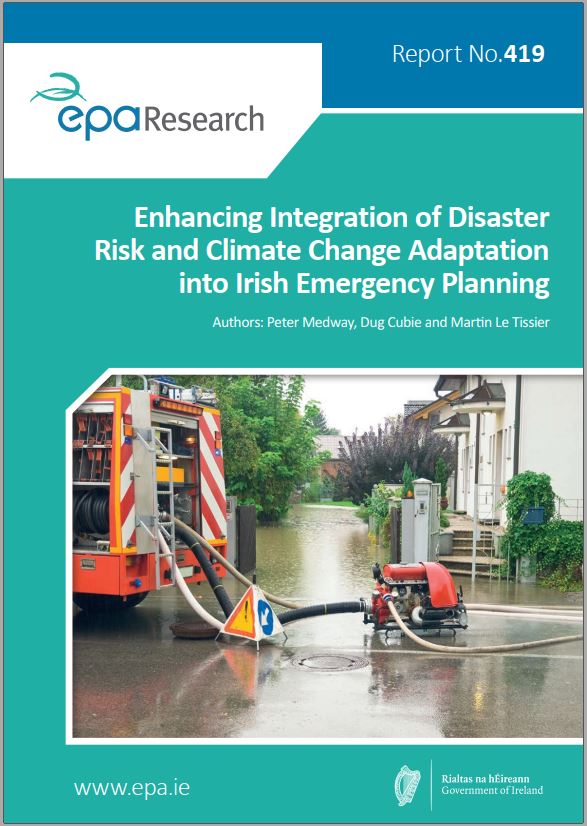Research 419: Enhancing Integration of Disaster Risk and Climate Change Adaptation into Irish Emergency Planning
Authors: Peter Medway, Dug Cubie and Martin Le Tissier
Summary: Climate research tells us that extreme weather events will become more frequent and severe. Climate change adaptation (CCA) focuses on the probable chronic long-term impacts likely to occur across multiple sectors. In contrast, emergency planning and disaster risk reduction (DRR) primarily aims to address acute short-term impacts. The project identifies how existing approaches to disaster risk reduction, disaster risk management (DRM) and CCA in Ireland are juxtaposed and concludes that identifying ways to promote coordination and align incentives, priorities and planning processes will facilitate a more holistic and comprehensive approach to DRM at all levels of government.

Project Highlights
Watch the project highlights video
Identifying Pressures
Climate research tells us that extreme weather events will become more frequent and severe. Climate change adaptation (CCA) focuses on the probable chronic long-term impacts likely to occur across multiple sectors. In contrast, emergency planning and disaster risk reduction (DRR) primarily aims to address acute short-term impacts. The challenge many countries face is to balance the immediate risks of extreme weather and climate events with planning for how these threats will evolve and alter future vulnerabilities of communities and/or environments. In Ireland, there is a portfolio of policies, plans, strategies and reports that address the consequences of climate change and emergency planning. However, emergency management and CCA are currently two discrete systems for governance, management and coordination at the national level. There is no nationally shared understanding of what constitutes “risk” and “resilience” to short-, medium- and long-term change, and how best to develop an integrated and holistic approach to both the long-term CCA needs and the more immediate emergency risk management needs.
Informing Policy
More coherent policies and practices for CCA, DRR and disaster risk management (DRM) ensure that responses do not conflict with one another (maladaptation). They also ensure that preserving the opportunities of the current generation does not compromise the opportunities of future generations. This desk study shows that emergency response planning is different from developing a long-term risk management policy that acknowledges Ireland’s increasing vulnerability to the climate crisis. Building on the existing Strategic Emergency Management and Major Emergency Management Frameworks, the report argues that a key objective for both short-term emergency planning and long-term CCA is to reduce vulnerability and increase the resilience of individuals, communities and national structures. Drawing on examples of European good practice, the report highlights that preventing new risk, and reducing the level of existing risk, will in turn reduce the remaining residual risk left to be managed.
Developing Solutions
The project identifies how existing approaches to DRR, DRM and CCA in Ireland are juxtaposed and concludes that identifying ways to promote coordination and align incentives, priorities and planning processes will facilitate a more holistic and comprehensive approach to DRM at all levels of government. In particular, the report argues that to achieve effective integration of the different frameworks all future policies and plans should consider the following six pathways, first identified by the Horizon 2020 ESPREssO project: sharing knowledge; harmonising capacity; institutionalising coordination; engaging stakeholders; leveraging investment; and developing communications.
The project findings were validated and revised by engagement with local communities, key stakeholders and sectors most likely to be affected by the existing and increasing risks of climate change. The report provides a high-level roadmap of guiding principles and a series of priority actions that the government and other stakeholders may wish to consider for achieving greater coherence and integration between the emergency management and climate adaptation frameworks in Ireland.
https://www.epa.ie/media/epa-2020/research/epa-funded-research/Report-cover-419.jpg